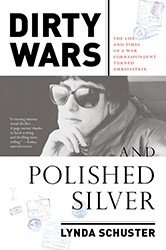
Lynda Schuster, author of Dirty Wars and Polished Silver, has been guest blogging for the Jewish Book Council as part of the Visiting Scribe series.
One of the epigraphs at the beginning of my memoir, Dirty Wars and Polished Silver, is taken from Joachim Fest’s haunting book, Not I. Fest’s coming-of-age memoir is set against the backdrop of the Third Reich in Germany and his father’s implacable opposition to the Nazis. When I came across this passage while writing my own memoir, it seemed an excellent encapsulation of the genre:
One does not, in retrospect, record what one has
experienced, but what time — with its increasing shifts
in perspective, with one’s own will to shape the chaos
of half-buried experiences — has made of it. By and large,
one records less how it actually was than how one
became who one is.
It also perfectly described the problem I had as a former journalist writing a memoir. Besides a near-Pavlovian aversion to first person pronouns — instilled in most print reporters on their first day of journalism school — I had to grapple with the even more bizarre concept of reporting out a story about myself. To say nothing of checking and rechecking those facts. (Although a writer friend, by way of explaining the craft, said: “You know, they don’t call it creative nonfiction for nothing.”)
My memoir chronicles my time as a foreign correspondent for the Wall Street Journal and as the wife of an American ambassador. That meant trying to verify more than twenty years of events. The book begins in Israel: rejecting my mother’s staid, Midwestern life and in search of adventure, I fled my home at age seventeen for a kibbutz in the Upper Galilee. (Because nice Jewish girls don’t run away to join the circus, they join a kibbutz.) The Yom Kippur War broke out almost immediately upon my arrival — a seminal event that set me on the path that would define my personal and professional life for decades.
As part of the first chapter, I wrote a scene about a Saturday dinner at the house of my kibbutz mother, Simcha, just after the war ended. Most people didn’t eat in the dining hall on Saturday nights; Sim, a gifted cook, always managed to make something different from the usual kibbutz fare in her microscopic kitchen. On that evening, as usual, she put me to work slicing peppers while she made a hash from bits of leftover chicken. Her daughters, Anat and Orly, bickered over who would set the table. They were still going at it when we finally sat down to eat: Anat complaining that Orly had been bothering her all day; Orly claiming the same of Anat. Simcha reminded them the country’s war had ended and it would be nice to have peace in the house as well, then left the table to answer a knock at the front door.
Anat peered around the archway to ensure her mother was out of sight. Carefully balancing a slice of tomato on her fork, she suddenly launched it at Orly as if on a catapult. Not to be outdone, Orly picked up a tomato piece and hurled it from the end of her fork to her sister’s side of the table. And then it was off to the races: tomato slices flying fast and furiously; both girls laughing uproariously; Orly shrieking, “Milchemet Haagvaniot” (The War of the Tomatoes!); me thinking that I never wanted to leave the place.
I did leave, though. Sim had seen dozens of similarly starry-eyed youngsters wash up on her shores, eager to jettison their former lives. She wasn’t having any of my idylls. Go study, she said. Which is how I became a journalist, covering foreign conflicts.
After writing the dinner scene, I sent it to Sim for verification. She informally adopted me many years ago and has remained a significant figure in my life. Sim forwarded it to her daughters. They didn’t remember the incident. Nothing. Nada. Zip.
How could this be? How could something so redolent to me of the time and place, something so formative to my young life, not be imprinted on their brains as well? Even now, I can remember the chill autumnal wind that blew through the slightly opened window; the tiny lights dancing across the recaptured Golan Heights; the soft splosh of tomatoes missiles hitting the dining room table; the girlish squeals of my kibbutz sisters. Maybe I had imagined the scene in all its sensory detail. Or — more likely — what was a quotidian, forgettable event for them became, for me, emblematic of the romance of starting out on one’s journey.
In the end, it didn’t matter. The scene wound up on the cutting room floor; ultimately, it didn’t fit with the chapter’s narrative flow. Nonetheless, it’s still exists, part of who I became and memorialized forever in my mind — if not in my book.
Check back on Thursday to read more from Lynda Schuster.
Lynda Schuster is a former foreign correspondent for the Wall Street Journal and Christian Science Monitor. She reported from Central and South America Mexico the Middle East and Africa. Her writing has appeared in the New York Times Sunday Magazine, The Atlantic, Granta, and Utne Reader. She is also the author of A Burning Hunger: One Family’s Struggle Against Apartheid.



